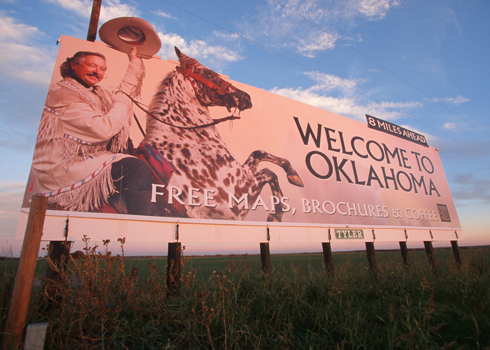So far, the outrage over the so-called Sharia ban Oklahoma voters approved this month has focused on the freedom of religion of the state’s Muslim residents, culminating in a lawsuit by a CAIR official that has successfully stalled the law from going into effect.
But there’s another minority the ban could affect: American Indians.
The proposed constitutional amendment, approved by voters in a 70-30 margin, would prohibit state courts from considering not only Sharia law, but international law — defined as the law of other “countries, states and tribes.”
Oklahoma has a relatively large population of American Indians, who make up about eight percent of the state population, compared to one percent of the country as a whole. Part of the reason so many Indians live in the state is forced relocation programs like the Trail of Tears, which moved tribes from land in the Deep South to what the federal government had designated Indian territory in Oklahoma.
It’s possible the amendment could affect how disputes between Indians and non-Indians are settled in state courts, as well as the many historic treaties between tribes and the U.S.
Last year, the Oklahoma Supreme Court ruled that personal injury lawsuits, filed by non-Indian casino patrons, could be tried in state court. It’s still messy, though: Several tribes have entered arbitration with the state over the rulings, and some of their motions are still pending.
And then there are the treaties between the state’s tribes and the federal government. The ban specifically defines international treaties as a “source of international law.” So how would the Indian treaties be treated?
No one really knows, yet. Tribes and tribal lawyers are waiting to see what happens, mostly voicing private concerns but no official positions.
“It wouldn’t seem like it would be legal,” Chris White, director of governmental affairs for the Osage Nation, told Indian Country Today. “I’m not an attorney, but that’s the reason why the people I’ve talked to about it are concerned. They’re concerned about the treaties.”
Barbara Warner, the executive director of the Oklahoma Indian Affairs Commission, told the Norman Transcript she’s heard concerns that the law could be “detrimental” to the tribes.
An Oklahoma University law professor, Taiawagi Helton, who specializes in tribal law, told the Transcript the language is too “ambiguous” and allows ways for the “opportunistic” to avoid tribal law that would hurt their case. But he added that he believes the law will be struck down.
“The likely effect is it won’t have much effect at all,” he said.
The amendment is barred from going into effect until Nov. 29, when a federal judge will rule on CAIR’s legal challenge.






